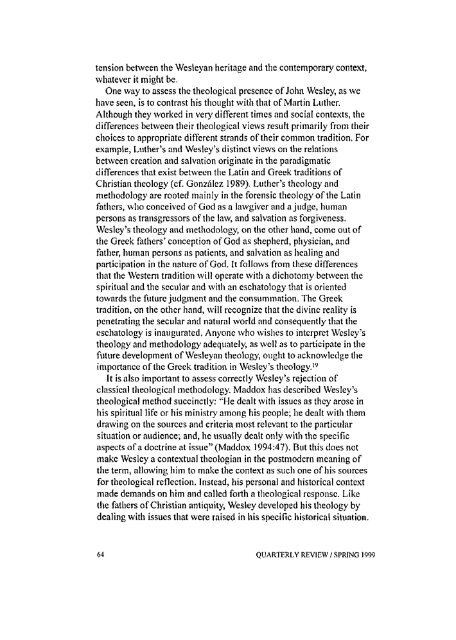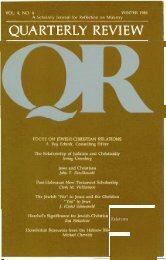Spring 1999 - Quarterly Review
Spring 1999 - Quarterly Review
Spring 1999 - Quarterly Review
Create successful ePaper yourself
Turn your PDF publications into a flip-book with our unique Google optimized e-Paper software.
tension between the Wesleyan heritage and the contemporary context,whatever it might be.One way to assess the theological presence of John Wesley, as wehave seen, is to contrast his thought with that of Martin Luther.Although they worked in very different times and social contexts, thedifferences between their theological views result primarily from theirchoices to appropriate different strands of their common tradition. Forexample, Luther's and Wesley's distinct views on the relationsbetween creation and salvation originate in the paradigmaticdifferences that exist between the Latin and Greek traditions ofChristian theology (cf. Gonzalez 1989). Luther's theology andmethodology are rooted mainly in the forensic theology of the Latinfathers, who conceived of God as a lawgiver and a judge, humanpersons as transgressors of the law, and salvation as forgiveness.Wesley's theology and methodology, on the other hand, come out ofthe Greek fathers' conception of God as shepherd, physician, andfather, human persons as patients, and salvation as healing andparticipation in the nature of God. It follows from these differencesthat the Western tradition will operate with a dichotomy between thespiritual and the secular and with an eschatology that is orientedtowards the future judgment and the consummation. The Greektradition, on the other hand, will recognize that the divine reality ispenetrating the secular and natural world and consequently that theeschatology is inaugurated. Anyone who wishes to interpret Wesley'stheology and methodology adequately, as well as to participate in thefuture development of Wesleyan theology, ought to acknowledge theimportance of the Greek tradition in Wesley's theology. 19It is also important to assess correctly Wesley's rejection ofclassical theological methodology. Maddox has described Wesley'stheological method succinctly: "He dealt with issues as they arose inhis spiritual life or his ministry among his people; he dealt with themdrawing on the sources and criteria most relevant to the particularsituation or audience; and, he usually dealt only with the specificaspects of a doctrine at issue" (Maddox 1994:47). But this does notmake Wesley a contextual theologian in the postmodern meaning ofthe term, allowing him to make the context as such one of his sourcesfor theological reflection. Instead, his personal and historical contextmade demands on him and called forth a theological response. Likethe fathers of Christian antiquity, Wesley developed his theology bydealing with issues that were raised in his specific historical situation.64 QUARTERLY REVIEW / SPRING <strong>1999</strong>












